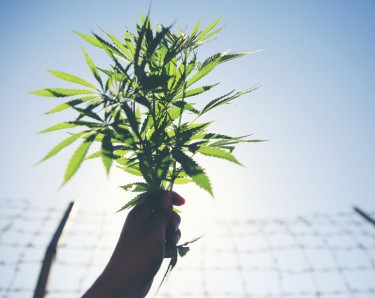
In a shocking turn of events that has garnered international attention, a 64-year-old Canadian citizen, Maurice Kevin O'Rourke, has been sentenced to life in prison in Dubai for possessing medical marijuana. This case raises significant questions about the intersection of drug laws, medical needs, and the rights of individuals traveling internationally. As the world becomes increasingly aware of the therapeutic benefits of cannabis, this incident highlights the stark differences in legal frameworks across countries and the potential consequences for those who inadvertently find themselves on the wrong side of the law.
The Case of Maurice Kevin O'Rourke
Maurice Kevin O'Rourke, a resident of Ontario, Canada, was traveling through Dubai International Airport when he was arrested in July 2023. His journey took a drastic turn when customs officials discovered CBD oil and cannabis in his luggage. O'Rourke had been using these substances to manage his health condition—Addison's disease—a rare disorder that affects the adrenal glands and can lead to severe health complications if not properly managed.
Despite his medical needs, O'Rourke faced the full brunt of Dubai's stringent drug laws. The United Arab Emirates (UAE) has a zero-tolerance policy towards drugs, including those that may be legally prescribed in other countries. This strict enforcement means that even trace amounts of illegal substances can result in severe penalties, including long prison sentences.
The Legal Landscape in Dubai
The UAE is known for its tough stance on drug-related offenses. The country's legal framework categorizes various substances into different classes, with severe penalties for possession, trafficking, and use. While many countries are moving towards more lenient policies regarding cannabis—especially for medical use—the UAE maintains a strict prohibition.
Under UAE law, possession of any amount of illegal drugs can lead to imprisonment. The penalties become increasingly severe based on the quantity found and whether the individual has prior convictions. In O'Rourke's case, the discovery of cannabis and CBD oil led to a life sentence, which is one of the harshest penalties under the law.
Health Implications for O'Rourke
O'Rourke's health condition complicates his situation significantly. Addison's disease requires careful management through medication and lifestyle adjustments. Those suffering from this condition often experience fatigue, muscle weakness, and low blood pressure. The stress of incarceration can exacerbate these symptoms and lead to further health complications.
Reports from O'Rourke's family indicate that his health has deteriorated since his imprisonment. He has faced inadequate medical care while incarcerated, raising concerns about his well-being and ability to manage his condition effectively. Advocates for O'Rourke argue that his medical needs should have been taken into consideration during his trial and sentencing.
Public Reaction and Advocacy
The sentencing of Maurice Kevin O'Rourke has sparked outrage among advocates for drug policy reform and human rights organizations. Many are calling attention to what they see as an excessively harsh punishment for someone who was using cannabis for legitimate medical purposes.
Organizations such as the Canadian Drug Policy Coalition have voiced their support for O'Rourke and have urged the Canadian government to intervene on his behalf. They argue that international travelers should not be penalized for using substances that are legal in their home countries, especially when those substances are used for medical reasons.
Public sentiment in Canada has also been largely sympathetic toward O'Rourke. Many Canadians view his case as emblematic of broader issues related to drug policy reform and the need for more compassionate approaches to individuals with medical needs.
The Role of the Canadian Government
As O'Rourke appeals his life sentence—with a hearing scheduled for December 25, 2023—the role of the Canadian government becomes crucial. While Canada has legalized cannabis at the federal level since 2018, its citizens traveling abroad must navigate vastly different legal landscapes.
The Canadian government has expressed concern over O'Rourke's situation but has limited options when it comes to intervening in another country's legal system. Diplomatic efforts may be necessary to advocate for a more lenient sentence or alternative solutions that prioritize O'Rourke's health needs.
International Perspectives on Cannabis Use
O'Rourke's case also highlights the growing divide between countries regarding cannabis use and regulation. In recent years, many nations have begun to recognize the medicinal properties of cannabis and have implemented policies allowing its use under certain conditions. Countries like Canada, several U.S. states, Uruguay, and parts of Europe have embraced legalization or decriminalization efforts.
Conversely, regions like the Middle East maintain strict prohibitions against cannabis use. This disparity creates challenges for travelers who may unknowingly violate local laws while seeking necessary medical treatments back home.
The Appeal Process
As Maurice Kevin O'Rourke prepares to appeal his life sentence, several factors will likely come into play during the process:
-
Legal Representation
O'Rourke will require competent legal representation familiar with UAE law and experienced in handling drug-related cases. A skilled attorney can help navigate the complexities of the legal system and advocate effectively on behalf of their client.
-
Medical Evidence
Given that O'Rourke was using cannabis for medical purposes, presenting credible medical evidence will be crucial during the appeal process. Documentation from healthcare professionals regarding his Addison's disease and treatment history could bolster his case by demonstrating that he was not using drugs recreationally but rather as part of a necessary health regimen.
-
Public Support
Public opinion can sometimes influence legal proceedings, especially in high-profile cases like O'Rourke's. Continued advocacy from human rights organizations and public figures may help draw attention to his plight and encourage a more favorable outcome during his appeal.
Potential Outcomes
While it is difficult to predict how O'Rourke's appeal will unfold, several outcomes are possible:
-
Reduced Sentence
One potential outcome could be a reduced sentence if the appeals court finds mitigating circumstances surrounding O’Rourke’s situation. This could involve acknowledging his medical condition and considering it as a factor in determining an appropriate penalty.
-
Alternative Sentencing
Another possibility is that the court might opt for alternative sentencing measures rather than life imprisonment. This could include probation or mandatory rehabilitation programs focusing on education about drug laws rather than punitive measures.
-
Extradition or Diplomatic Resolution
In some cases involving foreign nationals sentenced abroad, diplomatic negotiations can lead to extradition or other resolutions that allow individuals to serve their sentences in their home country under different conditions.
Conclusion
The case of Maurice Kevin O’Rourke, a 64-year-old Canadian citizen sentenced to life in a Dubai prison for possessing medical marijuana, starkly illustrates the complexities of global drug laws and their impact on individuals with legitimate medical needs; as he navigates the challenging appeal process amidst international advocacy and public support, it becomes essential to consider both the legal implications and humanitarian perspectives involved, emphasizing the urgent need for dialogue about drug policy reform not only in Canada but also worldwide, particularly as more countries adopt progressive approaches to cannabis use; this situation highlights the importance of ensuring that individuals seeking relief from debilitating health conditions are not unduly punished while traveling abroad, and as we await further developments regarding O’Rourke’s appeal scheduled for December 25th, it is crucial for governments globally to recognize the necessity for compassion in drug enforcement policies, especially concerning individuals using medications legally prescribed by their healthcare providers at home.
TRAVELING IN NON-WEED FRIENDLY COUNTRIES, READ ON...
AMERICAN DIES IN BALI PRISON FOR HAVING WEED IN HIS SUITCASE







